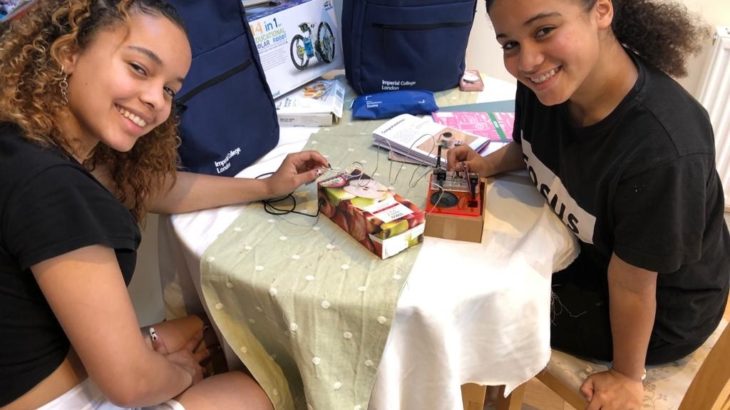Our universities, transforming communities, industries and the economy

In Research England’s recently released Knowledge Exchange Framework (KEF), we’re delighted that our seven member universities have been acknowledged for their commitment to innovation – including rising to the challenges posed by the COVID-19 pandemic.
The KEF explores how higher education institutions work with different types of partners to ensure their accomplishments can be shared and used for the benefit of the economy and society. The framework highlights areas where certain groupings of universities are excelling – all SES member institutes fall under ‘Cluster V’: broad-discipline universities with significant amounts of excellent research.
To celebrate our collective achievements, Lucie De Lacy explores some of the projects highlighted in the framework and their impact on communities, industries and the economy.
University of Cambridge: exploring the future of food
As part of its core goals, the University of Cambridge has focused on building local and regional partnerships in the private and public sector, helping to make economic growth more inclusive. This is clearly demonstrated in two major projects that focus on something that’s essential for all of us: food.
Agriculture has long played a vital role in the economy of the East of England, but to keep on feeding our growing nation, it needs to be even more sustainable and climate-aware.
![The Vegebot harvesting system, shown undergoing field experiments (Credit: Fumiya Iida, can be viewed at wileyonlinelibrary.com]](http://sesacuk.wpengine.com/wp-content/uploads/2021/08/Vegebot-1024x577.jpg)
Despite being developed for a specific purpose, the ‘Vegebot’ has the potential to help with labour shortages in agriculture and could also reduce food waste. Growing Underground is a farm that feeds the city from within the city, 33 metres below London’s Clapham High Street. Zero-carbon food sits at the core of this revolutionary farm, as down in the tunnels, engineers and data specialists support farmers to optimise crop performance and reduce energy use.
Imperial College London: practical science for the next generation
Rated as the UK’s most innovative university, Imperial’s mission is to achieve excellence in education and research for the benefit of society. Working in partnership with key local organisations, Imperial is developing a unique innovation ecosystem at White City.
Professor Nick Jennings, Vice Provost (Research and Enterprise) said: “Creating real world benefits is a core part of Imperial’s mission and I am delighted to see our efforts in this area recognised in the Knowledge Exchange Framework. Our integrated collaborative campus at White City will contribute to growth locally and beyond by bringing together researchers, businesses and the community to innovate and create.”
The White City Incubator is a hub for innovation and entrepreneurship, providing office and laboratory space, and support for early-stage companies, such as MediSieve. MediSieve is researching the use of magnetic technology to treat blood-borne diseases and recently pivoted their research to apply the technology to COVID-19 patients, improving their chance of fighting the disease. Larger industry partners have co-located at White City: Airbus, Saab and Smiths Detection have established offices as part of Imperial’s ambition to create a security and defence innovation ecosystem, which is led by a partnership between the Institute of Security Science and Technology (ISST) and the UK Government’s Defence and Security Accelerator (DASA).

Within the community, Imperial is recognised for The Invention Rooms – the first facility of its kind in the UK which has workshops, design studios and interactive spaces for community innovation. During lockdown, the university worked with Hammersmith and Fulham’s Family Assist team to send science backpacks to local children, keeping the next generation of STEM enthusiasts motivated while schools were closed.
King’s College London: partnerships for innovation
With ambitions to be a civic university right in the heart of London, King’s College London is creating strong bonds with local communities and organisations. #KingsLocal is the public face of King’s Vision 2029.
This spirit of partnership was represented in London’s First Demo Day, where innovative new businesses from King’s20 Accelerator, Imperial’s Venture Catalyst Challenge and UCL’s Hatchery presented their ideas to local and global investors. Extending across healthcare, education, AI and robotics, this partnership created a platform for a vibrant network of engineering and science projects to flourish.
National Gallery X (NGX) is another King’s partnership that’s using innovations to revolutionise public spaces. Working together with the National Gallery and Google Arts & Culture, NGX embraces immersive and experimental technologies to transform arts and cultural institutions, giving diverse sections of society the chance to interact with different kinds of work from artists and thinkers.
University of Oxford: future-first technology
The University of Oxford is committed to working collaboratively with partners to support local growth and regeneration. Researchers and students have contributed directly through innovation, entrepreneurial activities and business collaborations.
One such partnership is with the OxLEP – an incubator that champions Oxfordshire’s economic potential. From this, a pioneering development of 25 high performance, low carbon homes has been created by Greencore Construction. This provides a potential model for future housing developments.
The Oxford Foundry network demonstrates the power of partnerships. Throughout the COVID-19 pandemic it pulled together multidisciplinary teams from key partners – OxVent is the result of such a collaboration. Engineers and medics from the University of Oxford and King’s College London rapidly created this low-cost ventilator which now has the potential to be rolled out globally.
Patrick Grant, Pro-Vice Chancellor for Research at Oxford University said: “We are putting ambitious plans in place to develop new and existing science and innovation districts that will benefit Oxfordshire, as well as areas throughout the UK, by attracting greater inward investment, creating jobs and housing, and driving continued economic growth.
“Our work with OxLEP and Greencore Construction is an example where cutting-edge innovation can bring local benefits, but also helps us and others understand how developments can remain compatible with reaching our own, as well as national, net zero targets.”
Queen Mary University of London: saving lives and transforming education
Queen Mary University is a sprawling university with five campuses but is focused on supporting underfunded communities in east London, and doing so in a meaningful way.
Centre of the Cell is the first informal science learning centre to be based within working biomedical research laboratories, with aims to inspire children, young people and families. To date more than 200,000 participants have visited the centre to enjoy the wonders of STEM. Professor Fran Balkwill, Professor of Cancer Biology at Queen Mary University of London, said: “With our digital interactive STEM Pod Experience, series of presenter-led science shows and workshops, and our Youth Membership Scheme for 14–19-year-olds, there is something for every stage of a young person’s journey into a health science career.”
Alongside influential work in the community, Queens is also making huge medical advancements, using technology to battle the leading global cause of death and illness: heart attacks and strokes. In a world-first, researchers from Queen Mary University of London and partner universities have used artificial intelligence to accurately measure blood flow. These better predictions ultimately lead to improved patient care, as well as new insights into how the heart works.
University of Southampton: making breakthroughs in health and environmental studies
The University of Southampton has big ambitions in the field of science and engineering, while projects highlighted in the KEF underline its commitment to improving the economic, social and cultural life of the local area.
SurgeWatch brought together people from across the Solent region to learn about the science of flooding and invite discussion around the history of flooding events. This has created an online database detailing almost 1,000 coastal flood events over the past 2,000 years, leading to detailed studies into flood management.
By contributing to local regeneration, the university has also had a hand in some major medical breakthroughs. Southampton Science Park is an innovation hub housing new start-ups and leading technology businesses. Resident, Zelemiq Health, is set to revolutionise wearable sensor technology – meaning our smartwatches and trackers could soon do more for our day-to-day healthcare than we ever imagined.
University College London: exploring the future of life sciences
UCL is synonymous with world-leading research, but its work also addresses and informs societal concerns through key partnerships on a local and national level.
Chaired by UCL, and in collaboration with organisations such as the British Library, Google, the Wellcome Trust and Arts Catalyst, the Knowledge Quarter brings together strengths in life sciences, AI and machine learning to create a hub of excellence, aiding regeneration of the King’s Cross area.
Within the healthcare sector, UCL partners with future-facing developers to revolutionise how we care for people. UCL and Tend VR are exploring how virtual reality can help treat depression while UCL Ventura is a breathing aid designed to help keep COVID-19 patients out of intensive care. In a partnership between UCL engineers, UCLH clinicians and industry partners Mercedes-AMG High Performance Powertrains there have been 10,000 breathing aids manufactured.
Professor David Price, Vice Provost Research, Innovation and Global Engagement, said: “Our world-leading engineers continue to make research breakthroughs, working together with partners in industry, policy and practice to create new technologies and applications that can change all our lives.
“As we emerge from the global pandemic, the role of UCL and research-intensive, multi-disciplinary universities like it has never been more significant, and our ability to translate our commitment to research that improves lives into tangible action has never been more important.”


